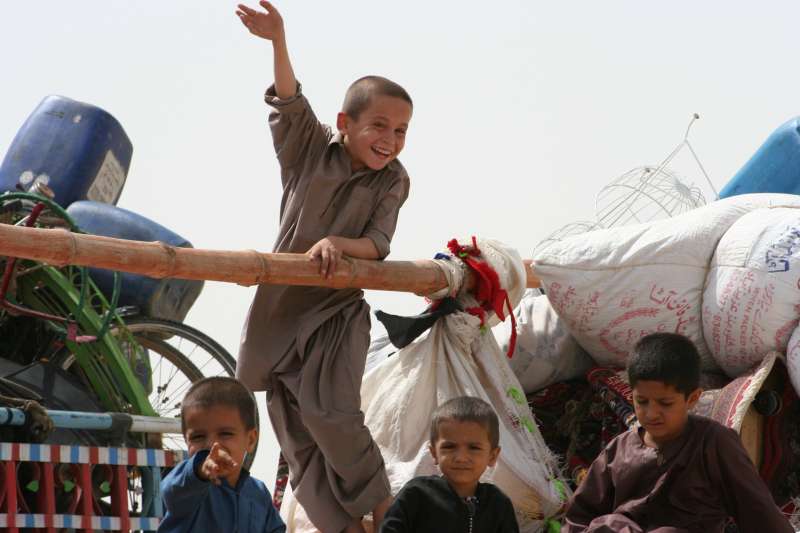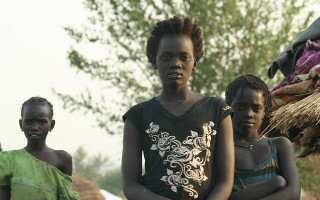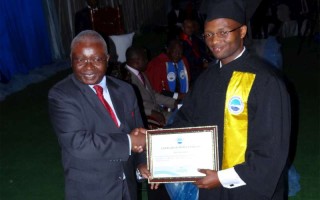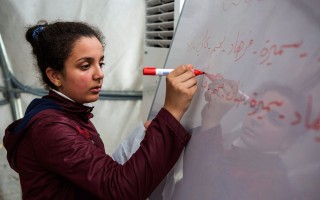
Young Afghan refugees on their way home to Afghanistan wave goodbye to Pakistan. © UNHCR / B. Baloch
KABUL, Afghanistan, November 20, 2014—The United Nations Convention on the Rights of the Child was adopted 25 years ago today to protect children like Hasanat and Aisha.
The two have returned to a homeland, Afghanistan, that they had heard much about but never visited. Half of Afghanistan’s five million returnees since 2002 were born in exile, mostly in Iran or Pakistan, which together still shelter 2.5 million Afghans.
Hasanat and Aisha face further challenges in a country that remains volatile and poverty stricken, and their stories reflect the vulnerability of childhood in the region as well as the resilience of young returnees.
What returnee children make of their lives will, to a large extent, determine the long-term success of the world’s largest voluntary repatriation and reintegration program and shape Afghanistan’s potential to build a peaceful and stable future. In 2014, some 12,000 Afghans have returned home from Pakistan.
Hasanat
“Afghanistan is now my home. I am happy and I will never leave,” declared eight-year-old Hasanat, whose extraordinary return journey from Pakistan began when he decided to repatriate on his own after hearing that his father in Afghanistan had fallen ill and his refugee mother refused to return.
“I was selling fruit and vegetables in front of the market in Karachi [in southern Pakistan],” he explained. “When I saw some trucks loaded with Afghans, I asked them where they were going. They said they were returning home to Afghanistan. I begged them ‘I want to see my sick father in Afghanistan,’ so they let me get on the truck.”
At the border with Afghanistan, he went to fetch water from a river and when he got back, the truck had gone. “The road was empty and I was alone,” he recalled.
Panic-stricken and traumatized, Hasanat survived the next two days by begging for food and sleeping on the streets of a town in eastern Afghanistan. A kind shopkeeper noticed the sobbing child, fed him and drew out his story. The man took care of Hasanat and contacted UNHCR to trace the boy’s family.
It was like searching for a needle in a haystack, as Hasanat was too young to give much information. Through luck and hard work, UNHCR protection staff tracked down his family in northern Afghanistan.
“I dream that my whole family will be reunited some day in Afghanistan, when things improve and they can have a better life at home than they have now in Pakistan,” sighed Hasanat’s father, a farmer in a drought-stricken province. Both Hasanat’s biological and foster families were provided with cash support under UNHCR’s project for extremely vulnerable individuals.
Aisha
Thirteen-year-old Aisha dreams of becoming a doctor. The top student enjoyed the benefits of a UNHCR-sponsored education in a Pakistan refugee village before going to Wardak province in Afghanistan. Her family fled to Kabul when they received threatening letters from the Taliban warning them to stop sending their daughter to school.
“I want my daughter to hold on to her dreams and study hard and have a better life than I have,” said her illiterate mother. “That’s why we stayed in Pakistan, and we have now moved from our village to Kabul, where there are schools and girls can have opportunities.” With UNHCR’s advocacy, the Ministry of Education granted permission for Aisha and thousands of other returnee and internally displaced children to enrol in Kabul schools.
Throughout Afghanistan, Taliban attacks have destroyed hundreds of schools – an estimated 6 per cent of the country’s education infrastructure. Parents have been threatened for sending their children –especially daughters – to school. Hundreds of pupils, teachers and education officials have been killed. The need for greater education opportunities in Afghanistan is one of the prime reasons why refugee families are hesitant to repatriate.
Humanitarian agencies like UNHCR have provided construction support for schools and sponsored catch-up education and vocational skills programmes for at-risk adolescents who have missed out on education due to war and displacement.
Article by Maya Ameratunga in Kabul, Afghanistan





